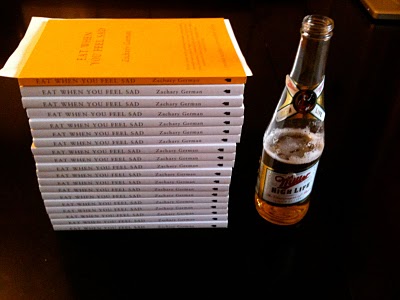On Zachary German’s “Eat When You Feel Sad”

[NOTE: The reviewer discloses several personal acquaintances, and asserts his unequivocal subjectivity.]
A Few Moments of Sleeping and Waking
.
When I was a kid my parents had a no-censorship policy on my reading material. The only exception they ever made to this rule was when I wanted to read a book that my dad was reading, called American Psycho. This was sometime in the mid ’90s, when the book was out of print. Dad had gotten it from a woman who worked in his office, who herself had found it on a website that specialized in hard-to-find books—probably the first person we ever knew who had used the internet to actually get something. I remember asking him about it, and that my interest was immediately piqued by his no-doubt abridged description. I remember asking to read it, and how, after much deliberation (which was baffling in itself, because I hadn’t meant “can I” so much as “when can I”) he finally told me, not without evident regret, that he would not let me read the book. “It’s not the content itself,” he said, “so much as that I don’t think you have the context to understand the content for what it is.” I must have expressed some outrage—this was unprecedented, after all—and he, concerned I might sneak a peek despite the ban, hid the book so well that we never found it again, even years later, when we emptied that house out and moved.
I started college in the summer of 2000, a few months after the film version of American Psycho debuted at Sundance. Now the book was everywhere. You could just walk into the store and buy a copy—with Christian Bale’s face on the cover, no less. I didn’t go see the movie in theaters, but I went and got the book. And I’ll tell you something—my father was absolutely right. Even at eighteen I didn’t really understand the book for what it was, namely the darkest of satires, mostly because I didn’t know enough about what was being satirized: Wall Street culture, the ‘80s in general, etc. So I took the book absolutely seriously, and treating it in this way made for one of the single most disturbing reading experiences I had ever had before, or have had since.
Zachary German would have been eleven years old the year American Psycho was released in theaters, and though I don’t know whether he saw the film before he read the book, it’s highly likely that a trailer for the film alerted him to the book’s existence in the first place. He would have understood going in, then, that the ultra-violence was a kind of cartoonish excess, and that the whole thing was to be understood (on some level) as a comedy, but he would have probably been still too young to fully grok how (or even that) the pathological cataloging of brand-names was meant as an extension of the central “joke.”
March 24th, 2010 / 3:56 pm
